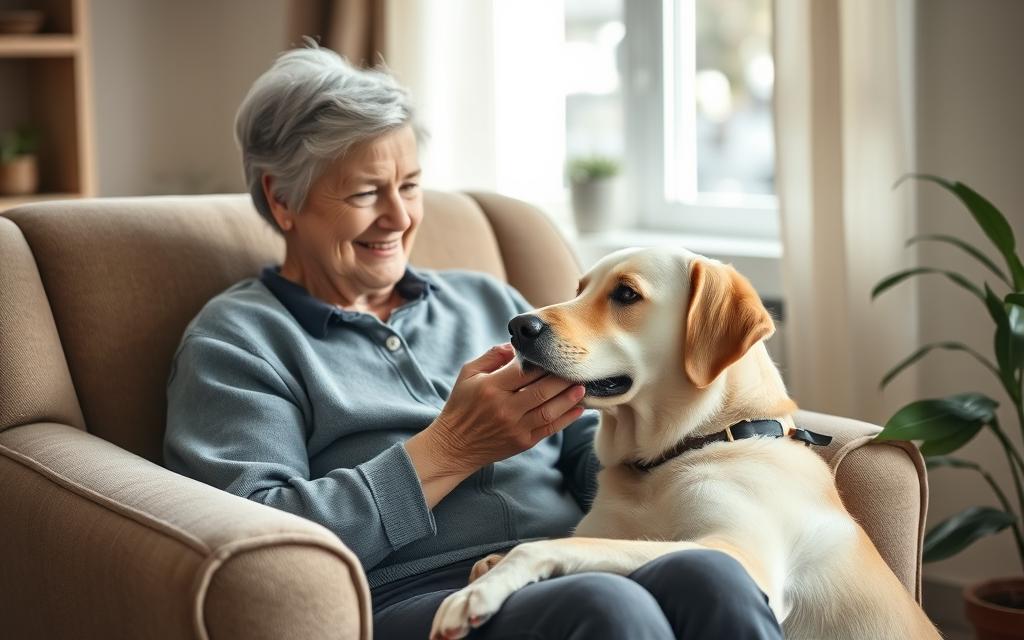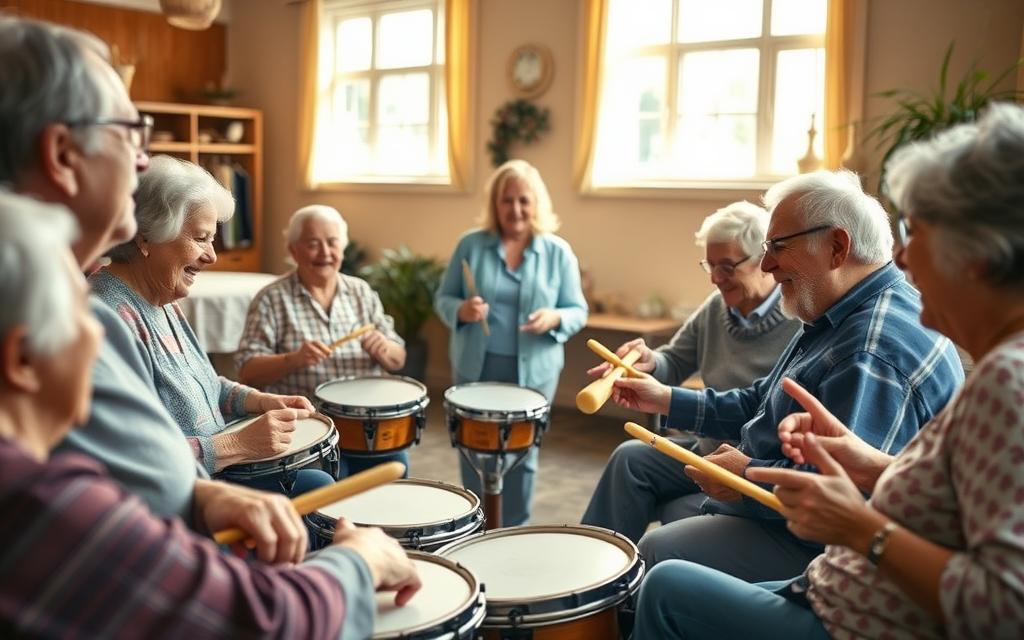Best Therapy Dogs Breed Guide 2025
Imagine having a constant friend that brings comfort and love. For many seniors, best therapy dogs are more than pets. They are a source of joy and friendship.
Ever wonder what makes a dog great for seniors? Is it their calm nature, their emotional support, or something else? The right therapy dog breed can change a senior’s life, bringing pet therapy joy.
Exploring therapy dogs, you’ll see what makes some dog breeds perfect for this job. Their gentle and loving temperament makes breeds like the retriever stand out.
Finding the perfect friend can be hard. But with the right help, you can find the best therapy dogs. They will bring happiness and comfort to those you care about.
Key Takeaways
- Understanding the role of therapy dogs in providing emotional support.
- Identifying the characteristics of ideal therapy dog breeds.
- Exploring popular dog breeds suited for therapy work.
- Learning how to choose the right therapy dog for senior citizens.
- The benefits of pet therapy for seniors’ mental and emotional well-being.
The Healing Connection: How Dog Therapy Benefits Senior Citizens
Therapy dogs are key in senior care. They bring comfort, emotional support, and friendship. Seniors feel less lonely and happier around them.
Understanding the Science Behind Human-Canine Bonds
Humans and dogs share a strong emotional bond. Studies show that being with dogs boosts oxytocin, the “love hormone.” This makes both humans and dogs feel good.
For seniors, this bond is very helpful. It gives them a friend and makes them feel less alone.
What Distinguishes Therapy Dogs from Service Animals
Therapy dogs and service animals are different. Service animals help people with disabilities. Therapy dogs comfort and support people in places like nursing homes.
Therapy dogs don’t have the same rights as service animals. But, they bring joy and connection to those they meet.
How Therapy Dogs Are Trained for Senior Care
Therapy dogs get special training. They learn basic commands, how to act in different places, and how to be calm with seniors.
Handlers also get trained. They learn how to make visits fun and helpful for everyone.
Best Therapy Dogs: Key Traits That Make a Perfect Companion
The best therapy dogs have special traits. They help seniors in many places. It’s important to look at their traits, not just their breed.
Essential Temperament for Therapeutic Success
A therapy dog’s temperament is very important. They should be calm, gentle, and even-tempered. They need to be calm in stressful places to comfort seniors.
They should also love people and be friendly. Being friendly helps them build trust with seniors.
Physical Characteristics That Matter in Therapy Settings
Physical traits are also important. The dog’s size matters. Small dogs fit well in small spaces, while big dogs offer comfort in bigger areas.
Think about grooming needs too. Dogs that don’t shed much or are hypoallergenic are great. They’re good for seniors with allergies.
| Physical Characteristic | Ideal Trait | Benefit to Seniors |
|---|---|---|
| Size | Compact or adaptable | Ease of mobility and interaction in various living spaces |
| Coat Type | Low-shedding or hypoallergenic | Reduced allergen exposure for seniors with sensitivities |
| Energy Level | Moderate to low | Less strain on seniors during interactions, promoting relaxation |
Adaptability to Various Senior Living Environments
Therapy dogs need to adapt to different places. They work in nursing homes and private homes. They must be good with seniors who are different.
A good therapy dog can go anywhere. They bring comfort to seniors no matter where they live. This is why they are so important.
Labrador Retrievers: Loyal Therapy Partners for Senior Citizens
Labrador Retrievers are great at giving comfort and company. They are friendly and love to be around people. This makes them perfect for helping seniors.
Temperament Traits That Make Labs Exceptional Healers
Labrador Retrievers are gentle and patient. They love being around people. Their intelligence and trainability help them be good therapy dogs.
They make seniors feel less stressed and anxious. They also love being petted and cuddled. This makes them very comforting for the elderly.
How Labradors Connect with People of All Ages
Labrador Retrievers can connect with people of all ages. They know when someone is feeling down. They try to make them feel better.
For seniors, Labradors are great friends. They help fight loneliness and isolation. They also encourage seniors to be more active.
Golden Retrievers: The Ultimate Therapy Dog for Elderly Care
Golden Retrievers are amazing therapy dogs. They bring love and comfort to the elderly. Their gentle, smart, and loving nature makes them perfect for nursing homes and memory care.

Why Goldens Excel in Providing Comfort and Support
Golden Retrievers are great at giving comfort and emotional support. They are friendly, which makes seniors feel better. Their intelligence and trainability help them in therapy work.
These dogs are more than friends; they are therapeutic partners. They can be trained to help seniors in many ways. Their presence makes life better for the elderly, in nursing homes and memory care.
| Trait | Benefit | Impact on Elderly Care |
|---|---|---|
| Gentle Nature | Provides Comfort | Reduces Stress and Anxiety |
| Intelligence | Easy to Train | Enhances Therapy Effectiveness |
| Affectionate | Encourages Social Interaction | Fights Loneliness and Isolation |
Success Stories in Nursing Homes and Memory Care
Many stories show how Golden Retrievers help in nursing homes and memory care. For example, a Golden Retriever named Max visited a nursing home. He became a favorite among the residents. Max’s visits helped people talk more and feel better.
In another place, a memory care facility used Golden Retrievers in therapy. This made the place calmer. The dogs helped the seniors feel better and more at peace.
Poodles: Intelligent and Hypoallergenic Therapy Companions
Poodles are smart and come in different sizes. They are great therapy dogs for the elderly. They are perfect for seniors with allergies too.
Benefits of Different Poodle Sizes in Therapy Settings
Poodles have sizes like Toy, Miniature, and Standard. Each size has its own benefits. Toy Poodles are great for small places and give lots of love. Standard Poodles are big and comforting. Miniature Poodles are just right, being small but strong enough for fun activities.
Why Poodles Are Ideal for Seniors with Allergies
Poodles have a special coat that sheds very little. This makes them perfect for seniors with allergies. Their coat is safe for seniors to be around.
Poodles are also easy to train. They learn to be calm and predictable. This makes them great therapy dogs for seniors.
Cavalier King Charles Spaniels: Gentle Souls for Emotional Support
Seniors looking for friends find Cavalier King Charles Spaniels perfect. They are calm and loving. This makes them great for helping seniors feel better in their homes.
Perfect Size and Temperament for Senior Living
Cavalier King Charles Spaniels are known for being gentle and loving. They are the right size for many homes. Their friendly and outgoing nature helps them connect with seniors.

How These Spaniels Provide Therapeutic Benefits
Cavalier King Charles Spaniels offer many benefits. They give emotional support and comfort. This is very helpful for seniors who feel lonely or isolated.
They also help people talk and make friends. Their calm nature can make seniors feel less stressed and anxious. Adding these dogs to therapy programs can make life better for seniors.
Yorkshire Terriers: Pocket-Sized Therapy Dogs with Big Hearts
Yorkshire Terriers are small but have big hearts. They are great therapy dogs. They love people and are perfect for seniors.
Advantages of Small Therapy Dogs for Seniors
Small therapy dogs like Yorkshire Terriers are great for seniors.
- They are less scary than big dogs, so seniors feel more comfortable around them.
- They are easy to take places because they are small.
Being small is a big plus. They can go on visits to many places. This includes nursing homes and hospitals.
The Yorkie’s Affectionate Nature in Therapeutic Settings
Yorkshire Terriers love people. This makes them great in places where people need comfort.
They are very loving when they meet seniors. This makes everyone feel calm and happy.
| Characteristics | Benefits |
|---|---|
| Affectionate Nature | Provides emotional comfort and companionship |
| Small Size | Easier to manage in tight spaces, less intimidating |
| Portability | Allows for therapy sessions in various settings |
Yorkshire Terriers are amazing therapy dogs. Their size and love for people make them perfect for seniors.
Beagles: Friendly and Engaging Therapy Companions
Beagles are known for being friendly and outgoing. They make great therapy dogs. Their small size and gentle nature help them bond well with people, which is great in therapy settings.

The Beagle’s Social Nature and Therapeutic Value
Beagles love to be around people. They are friendly and curious. This makes them ideal for engaging with seniors in care settings. They quickly form close bonds, giving comfort and emotional support.
Beagles have a special way of connecting with people. Their presence can help lower stress and anxiety. This leads to a calm and happy feeling.
How Their Sense of Smell Enhances Therapy Interactions
Beagles have an exceptional sense of smell. This is great in therapy settings. By playing scent games or letting them sniff, Beagles make therapy fun and engaging for seniors.
| Therapy Aspect | Beagle’s Contribution |
|---|---|
| Social Interaction | Beagles encourage social interaction through their friendly nature. |
| Sensory Stimulation | Their sense of smell provides a unique form of sensory stimulation. |
| Emotional Support | Beagles offer emotional support and comfort through their presence. |
Using Beagles in therapy programs makes therapy better for seniors. Their friendly and social nature, along with their keen senses, makes them great companions in therapy.
German Shepherds: Breaking Stereotypes in Senior Therapy
German Shepherds are often seen as working dogs. But they can also be great therapy dogs for the elderly. They have a gentle side that helps a lot in senior therapy.
The Gentle Side of a Working Breed
German Shepherds are smart, loyal, and protective. But they also form strong bonds with people. As therapy dogs, they give emotional support and comfort to seniors.
They help seniors feel less lonely and isolated. Their intelligence and trainability let them fit well in therapy settings. They can even help in nursing homes and memory care facilities.
Benefits of Pet Therapy with Larger Dogs
Larger dogs like German Shepherds offer special benefits in therapy. They are great for seniors who can’t move much or have memory problems. A well-trained German Shepherd is very comforting.
| Therapy Dog Trait | Benefit to Seniors |
|---|---|
| Gentle Nature | Provides comfort and reduces anxiety |
| Intelligence | Can be trained for complex therapy tasks |
| Loyal Companion | Encourages social interaction and emotional support |
German Shepherds can be amazing in senior therapy if they’re trained right. They can show seniors joy and comfort. This breaks stereotypes and helps many seniors.
Exploring the Benefits of Pet Therapy for Seniors: Making the Right Choice
You now know about therapy dog breeds that bring joy to seniors. Thinking about pet therapy for your loved ones? It’s key to weigh the benefits and make a smart choice.
Pet therapy helps seniors feel supported, have friends, and feel calm. Choosing the right therapy dog can make seniors’ lives better. This is true in nursing homes, assisted living, or private care.
When picking the right dog, think about its personality, size, and energy. Also, consider the senior’s needs, likes, and where they live. For example, a small dog like a Yorkshire Terrier is great for seniors who can’t move much. A big dog like a Labrador Retriever is better for active seniors.
Understanding pet therapy’s benefits and picking the right dog can create a strong bond. This bond can greatly improve the senior’s life.
Resources:



